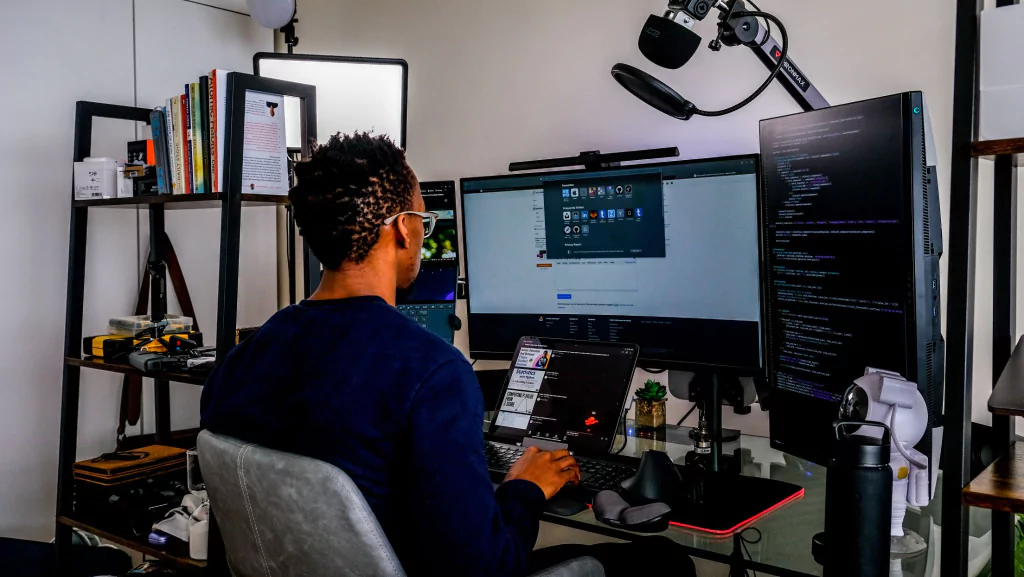In the world of coding and programming, success has traditionally been synonymous with holding a computer science degree. However, the winds of change are swiftly blowing through this narrative. Today, the internet is a treasure trove, brimming with abundant resources that equip aspiring programmers with the necessary tools to excel in the tech industry.

✅ AI Essay Writer ✅ AI Detector ✅ Plagchecker ✅ Paraphraser
✅ Summarizer ✅ Citation Generator

Key Takeaways:
- As demonstrated by several personal accounts, passion, dedication, and self-learning can lead to successful careers in programming, even without traditional computer science degrees.
- Online communities offer invaluable support and resources for self-taught programmers, aiding their learning journey.
- From dealing with imposter syndrome to balancing learning with a full-time job, the path to becoming a self-taught programmer includes facing and overcoming numerous obstacles.
Meet “Tom,” a self-taught programmer who recently secured his first job in the tech industry. “I’m thrilled to have landed my first programming job,” shares Tom. In what could be termed as a testimony of tenacity, Tom recounts his inspiring journey. “It has certainly been an expedition marked by sleepless nights, constant problem-solving, and an immeasurable amount of caffeine,” he shares. The underlying message of Tom’s narrative is a powerful endorsement of what grit and unwavering dedication can help one accomplish.
Online Learning in Programming: Is it Really a Piece of Cake?
Then there’s Emma, another self-taught programmer who believes in the power of online communities for learning. “I learned so much from forums, online tutorials, and free coding resources,” Emma admits. “Being part of a community, sharing doubts, and learning together was an incredible experience.” Emma’s journey underlines the power of collaboration and community in the self-learning process.
In contrast to the uplifting stories, Sophie, a software engineer, shared some sobering truths. “While it’s great to celebrate these achievements, we should also talk about the struggles,” Sophie pointed out. “Balancing learning with a full-time job, dealing with imposter syndrome, and constantly doubting yourself are part of the journey too.” Sophie’s story introduces a much-needed dose of reality to the conversation, highlighting that behind every success story, there’s a tale of hardship and perseverance.
Not Everything Should Be Hard
Jason, a veteran developer, after hearing out both sides, offered words of encouragement for those on their self-learning journey. “Remember, everyone has to start somewhere. Don’t be disheartened by challenges. They’re stepping stones, not roadblocks,” Jason advises.
A tech recruiter Alex seemed to agree with this comment, and shared his practical advice for aspiring programmers. “Building a portfolio is crucial,” he suggested. “Showcasing your work, whether it’s an app, a website, or contributions to open-source projects, helps to demonstrate your skills and passion to potential employers.” Alex’s insider perspective is invaluable for those looking to break into the industry.
Final Remarks
In essence, these personal accounts weave a vibrant tapestry of the self-learning journey in programming. From Tom’s triumphant success to Emma’s community-based learning, Jason’s words of wisdom, Sophie’s sobering truths, and Alex’s practical advice, these stories inspire, guide, and motivate. The road to becoming a self-taught programmer may be challenging, but as these individuals have demonstrated, it’s a journey that’s as rewarding as it is demanding. As we navigate the digital age, one thing is certain: the power of self-learning is revolutionizing the tech industry.
Why Formal Computer Science Education Isn’t Always Necessary for Success
The narrative that a computer science degree is a must-have for a successful programming career is gradually being rewritten. Many self-taught programmers are landing coveted tech jobs, proving that formal education isn’t always a prerequisite for success in this field. There are compelling reasons behind this shift, underscoring the value of alternative learning paths. Let’s explore five of these.
Availability of Online Resources
The internet is teeming with programming tutorials, coding bootcamps, and online courses, many of them free or at a low cost. This wealth of resources has democratized learning and opened up opportunities for many to learn programming without a traditional education.
Practical Experience
Self-teaching often involves hands-on coding projects, which can provide real-world experience. This practical exposure can sometimes be more valuable than theoretical knowledge, as it aligns closely with the day-to-day tasks of a programmer.
Flexibility in Learning
Self-learning allows for a flexible, tailored approach. Learners can focus on the languages and frameworks most relevant to their career goals or the tech industry’s current demands.
Portfolio Building
Those who teach themselves to code often build a portfolio of projects along the way. This portfolio can serve as a testament to their skills, dedication, and ability to apply their knowledge – a tangible proof often highly valued by employers.
Growth Mindset
The journey of self-teaching often cultivates a growth mindset, resilience, and problem-solving skills – traits highly sought after in the tech industry. This self-motivated learning showcases an individual’s drive and determination, reflecting potential for ongoing growth in their programming career.
While formal computer science education remains valuable, these points underscore that it’s not the only route to success in the programming world. The rise of self-taught programmers signals a shift in the tech industry, one that embraces diverse learning paths and experiences.
Related stories:
A Student Struggles With Coding Motivation Crisis. Reddit Community Steps in with Lifehacks
Chart Your Career in Data Analytics: Top 10 Ph.D. Programs for 2023
C++ for Beginners: Top Learning Resources Explained
Follow us on Reddit for more insights and updates.





Comments (0)
Welcome to A*Help comments!
We’re all about debate and discussion at A*Help.
We value the diverse opinions of users, so you may find points of view that you don’t agree with. And that’s cool. However, there are certain things we’re not OK with: attempts to manipulate our data in any way, for example, or the posting of discriminative, offensive, hateful, or disparaging material.